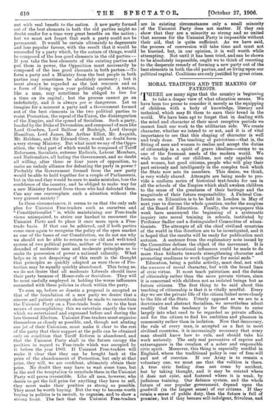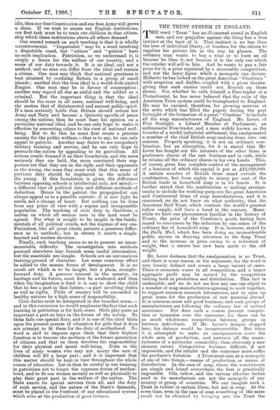MORAL TRAINING AND THE MAKING OF PATRIOTS.
THERE are many signs that the country is beginning to take a deeper view of what education means. We have been too prone to consider it merely as the equipping of children with a body of knowledge, literary and technical, which may fit them to earn their bread in the world. We have been apt to forget that in dealing with the mind and character at their most receptive periods we cannot limit our work to the utilitarian side. We create character, whether we intend to or not, and it is of vital importance to see that this shaping of character is well and truly done. The teaching of patriotism—that is, the fitting of men and women to realise and accept the duties of citizenship in a spirit of grave idealism—seems to us one of the foremost needs of the modern world. We wish to make of our children, not only capable men and women, but good citizens, people who will play their part seriously and intelligently in the complex task which the State now sets its members. This desire, we think, is very widely shared. Attempts are being made to pro- vide a uniform series of historical text-books for use in all the schools of the Empire which shall awaken children to the sense of the greatness of their heritage and the magnitude of their future responsibility. A Federal Con- ference on Education is to be held in London in May of next year to discuss the whole question, under the auspices of the Board of Education. Finally, the newspapers this week have announced the beginning of a systematic inquiry into moral training in schools, instituted by Professor Sadler and a distinguished Committee of educa- tionists. The attempts of all the chief civilised countries of the world in this direction are to be investigated, and it is hoped that the results will be ready for publication neit autumn. A sentence from the explanatory note issued by the Committee defines the object of the movement. It is believed that educational influences could be made to do more than hitherto towards strengthening character and promoting readiness to work together for social ends."
Education, being a public activity, must deal, not with the nuances of moral character, but with the broad lines of civic virtue. It must teach patriotism and the duties of citizenship rather than the more private virtues, since it is concerned with children not as isolated beings but as future citizens. The first thing to be said about this teaching of citizenship is that it is vitally needful. Every day we see the private life of the citizen linked more closely to the life of the State. Utterly opposed as we are to a doctrinaire and abstract Socialism, we nevertheless admit readily that the tendency is for the State to enter largely into what used to be regarded as private affairs, and for the citizen to find his ambition and pleasure in community rather than in isolation. Now that democracy, the rule of every man, is accepted as a fact in most civilised countries, it is increasingly necessary that every man should know how to rule, and should take his work seriously. The only real preventive of caprice and extravagance is the creation of a sober and responsible civic spirit. Moreover, this thing is especially needful in England, where the traditional policy is one of free-will and not of coercion. If our Army is to remain a voluntary one, we must see that the volition is there. A true civic feeling does not come by accident, but by taking thought, and it may be created where it does not exist, and fostered where it is weak, by judicious training. Our defence system, and the whole future of our popular government, depend upon the goodwill (in the largest sense) of our citizens. If they retain a sense of public duty, then the future is full of promise; but if they become self-indulgent, frivolous, and idle, then our free Constitution and our free Army will prove a sham. If we wish to secure our English institutions, our first task must be to train our children in that citizen- ship which these institutions above all others demand.
Our second remark on such teaching is that it is wholly uncontroversial. " Imperialist " may be a word involving a disputable creed, but " citizen " and " patriot " have no such implication. Patriotism, as we understand it, is simply a desire for the welfare of our country, and a sense of our duty towards it. It is an ideal, and not a method, and no man can differ from the ideal and remain a citizen. One man may think that national greatness is best attained by confining Britain to a group of small islands ; another that the true ideal is a world-wide united Empire. One man may be in favour of conscription ; another may regard all war as sinful and the soldier as a criminal. But the important thing is that the ideal should be the same in all cases, national well-being, and the motive that of disinterested and earnest public spirit. If a man seriously holds that Britain should reduce her Army and Navy and become a Quixotic apostle of peace among the nations, then he must base his opinion on a particular national ideal, and be can only hope to make it effective by converting others to his view of national well- being. But to do this he must first create a genuine anxiety for the public welfare,—that is to say, he can only appeal to patriots. Another may desire to see compulsory military training and service, and he can only hope to persuade the nation by appealing to its patriotism. All serious creeds demand it as their foundation, and the more seriously they are held, the more convinced their sup- porters are that they are in the right and their opponents in the wrong, the more they must wish that this sense of patriotic duty should be implanted in the minds of the young. If this foundation is given, the ,difference between opposing schools is intellectual only, not moral,— a different view of political data and different methods of deduction. Hence to the patriot the propagandist can always appeal as to a possible convert: it is new light he needs, not a change of heart. But nothing can be done from any point of view with a supine and irresponsible population. The teaching of civic duty is, therefore, a matter on which all serious men in the land must be agreed. For what is sought to be taught is the funda- mentals of all political creeds, not the dogmas of any one. Patriotism, like all great ideals, permits a generous differ- ence as to methods ; but in return it exacts a single- hearted and austere devotion.
Finally, such teaching seems to us to present no insur- mountable difficulty. °The investigation into methods pursued elsewhere may furnish some useful information, but the essentials are simple. Schools are an unconscious training-ground of character. Let some conscious effort be added to the unseen forces of development. It is no occult art which is to be taught, but a. plain, straight- forward duty. A genuine interest in the country, its heritage and its future, must first be awakened, and then when the imagination is fired it is easy to show the child that he has a part in that future,—a part involving duties as well as rights. Pride of country will be succeeded in healthy natures by a high sense of responsibility.
Civic duties must be interpreted in the broadest sense,— and in this connexion we would emphasise the fact that such training in patriotism is for both sexes. Girls play quite as important a part as boys in the future of the nation. To them falls one special duty, and it is one of the chief blots upon the present system of education for girls that it does not attempt to fit them for the duty of motherhood. No word is said to impress upon them that their highest function is to become the mothers of the future generation of citizens, and that on them devolves the responsibility for their physical and moral well-being. Even in the lives of many women who may not marry the care of children will fill a large part ; and it is important that this matter should be kept in view throughout the whole course of education. Let us then be careful in our training in patriotism not to forget the supreme duties of mother- hood, and to fit our women morally as well as physically to play their great part in the welfare of the nation. The State exacts its special services from all, and the duty Of such service, and the nature of the State's demands, must be placed in the forefront of any educational system which aims at the production of goo.t.1 citizens.















































 Previous page
Previous page